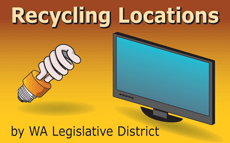First solar product stewardship law passed in Washington State

FOR IMMEDIATE RELEASE
July 18, 2017
Contact:
Amanda Reykdal, Washington Coordinator – coordinator@productstewardship.net – (425) 445-4759
First-in-the-nation legislation requiring manufacturers to recycle used solar units signed into law
The Solar Incentives Job Bill requires manufacturers to manage and finance the safe recycling of solar units at end of life, at no cost to the owner of the product
Olympia, WA— The Solar Incentives Job Bill (ESSB 5939) was signed into law by Gov. Jay Inslee of Washington State on July 7, requiring manufacturers to finance and manage a product stewardship program that ensures used solar units are recycled. This is a significant step toward a truly sustainable and responsible solar energy industry, and the stewardship requirement is the first of its kind for solar modules in the United States.
"This legislation establishes Washington State as a leader in sustainability and stewardship of this technology," said State Rep. Norma Smith (R-Clinton), who championed the product stewardship requirement. "We included the product stewardship element in this bill as part of a comprehensive approach to solving our state's most pressing environmental issues. It would be shortsighted to introduce a bill that expands the number of solar units in our state, and not have a strategy for safe recycling when they’re no longer functional."
"The Solar Incentives Job Bill sets a precedent for future solar legislation to include a recycling program" explains Heather Trim, Executive Director at Zero Waste Washington. Zero Waste Washington worked with the Northwest Product Stewardship Council in drafting policy language. "This requirement models a producer responsibility approach as a component to include as other states expand solar programs."
In Washington, the stewardship requirement is part of larger bill that incentivizes solar unit ownership and creates solar jobs locally. The stewardship requirement states that manufacturers who sell solar units in the state of Washington after July 1, 2017, are responsible for financing and providing a recycling program for their units. Manufacturers who do not provide a recycling program cannot sell solar modules after January 1, 2021. This recycling requirement covers:
- Solar modules used on or in buildings
- Freestanding off-grid power generation systems such as water pumping stations
- Electric vehicle charging stations
- Solar fencing, solar-powered signs and solar-powered street lights.
It does not include small solar-powered consumer electronics such as watches and calculators.
Smith contends that "we need to be responsible stewards for each and every one of these technologies." Solar modules contain hazardous materials, rare earth elements, and other materials that have to be recycled properly. "As we pursue our conservation goals, it is critical that we pay the cost of our own consumption and not leave that to another generation."
By law, the stewardship program must provide regional take back locations where solar modules can be delivered for proper recycling at no cost to the last owner of the unit. Manufacturers have the flexibility to collect discarded modules individually or collectively with other companies. The Department of Ecology will provide guidance to manufacturers on developing their programs.
New solar module recycling jobs and businesses are expected as a result of the legislation. Washington State already has job-producing stewardship laws for electronics and mercury lighting. Four counties have stewardship laws for leftover medicine.
Learn more about NWPSC's work on the NWPSC website, or contact Amanda Reykdal at (425) 445-4759.
About the Northwest Product Stewardship Council
The Northwest Product Stewardship Council (NWPSC) is a coalition of government organizations in Washington and Oregon that operates as an unincorporated association of members and is comprised of a Steering Committee, Associates and Committees. NWPSC's mission is to enhance Washington's and Oregon's reuse, recycling and waste management systems by working with the waste and recycling industry, consumers, manufacturers and others to connect producers with the costs associated with the end-of-life management of their products to provide incentives for reducing waste, increasing recyclability, and reducing the toxicity of their products.
Follow us on Twitter @StewardshipNW.
PDF version of this press release
